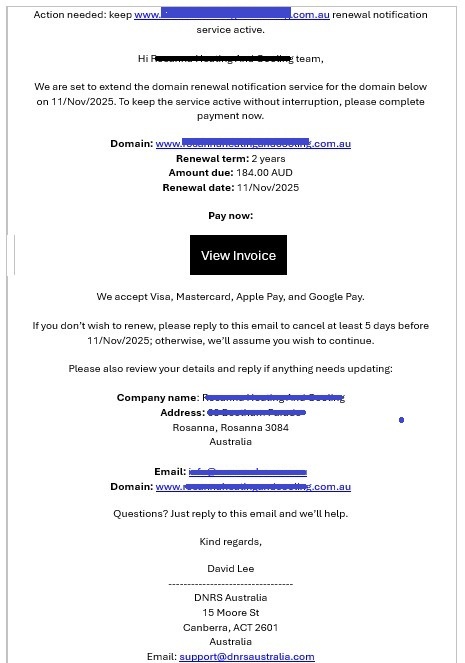
DNRS Australia: Scam Alert?
If you’re a business owner or someone who owns a domain name, it’s highly likely you’ve received emails from time to time that just look a bit off. It’s wise to be cautious. If you have a domain renewal email that you’re not familiar with, it’s always best to check with your agency who handles these services, or, if you manage things yourself, cross-check the information against your own records or past invoices from legitimate providers.
This article aims to help you sort out what’s real and what might be a scam, and how to deal with it. One things for sure, if you get an email from DNRS Australia it is not going to be legitimate!
Key Takeaways
- Be alert for emails that try to rush you into making payments or confirming details for your domain name, especially if they seem unofficial.
- Always check the sender’s email address carefully. Scammers often use addresses that look similar to legitimate ones but aren’t quite right.
- Never click on links or open attachments in suspicious emails. These can lead to fake websites or install harmful software.
- If you’re unsure about any communication regarding your domain name, contact your domain registrar directly using contact details you know are correct.
- Visit Scamwatch and the Australian Cyber Security Centre websites for more information on identifying and reporting online scams.
Understanding the DNRS Australia Scam Email
Identifying Suspicious Renewal Notices
It’s important to be aware of emails that might be trying to trick you into thinking they’re from a legitimate source, especially when it comes to your domain name. Recently, there have been reports of scam emails circulating from a company called DNRS Australia. These messages often arrive as unsolicited renewal notices, sometimes arriving much earlier than your actual renewal date – up to 10 months in advance. They might present themselves as an invoice, often including a PDF attachment.

A key indicator to watch for is the payment method mentioned; for instance, if an email suggests payment via Apple Pay, and you know your registrar does not support this, it’s a significant red flag. Always remember that legitimate communications will typically come from official email addresses associated with the organisation. If you’re unsure, it’s always best to check directly with the company rather than relying on the email’s content.
Recognising Impersonation Tactics
Scammers are getting quite sophisticated, and a common tactic is to impersonate official bodies or well-known companies. In the case of domain name scams, you might receive an email that looks like it’s from a regulatory authority like auDA, or a legitimate domain name company. These emails often try to create a sense of urgency, perhaps by threatening the loss of your domain name if you don’t act quickly. They might ask you to click on links to ‘verify’ your details or pay an invoice. Never click on links or download attachments from suspicious emails. These links can lead to fake websites designed to steal your login credentials or personal information, or they could initiate malware downloads. Always verify the sender’s email address carefully; legitimate organisations will use their official domain names. If an email claims to be from an organisation you deal with, but the sender’s address looks unusual (e.g., a free email service or a slightly misspelled domain), treat it with extreme caution.
The Role of auDA and Scamwatch
When dealing with .au domain names, auDA is the governing body. They, along with organisations like the ACCC’s Scamwatch, play a vital role in alerting the public to online threats. Scamwatch, in particular, is a fantastic resource for Australians to report scams and learn how to protect themselves. If you receive a suspicious email claiming to be from auDA or DNRS Australia, it’s worth checking the official auDA and Scamwatch websites. They often publish alerts about current scams targeting domain registrants. These government bodies work to identify and publicise fraudulent activities, helping individuals like yourself avoid falling victim. Reporting these scams is crucial as it helps authorities track and combat these malicious operations. If you’ve been targeted, consider reporting it to Scamwatch and potentially the Australian Cyber Security Centre.
Common Tactics Used in Domain Scams
You’ve likely seen them – those emails that land in your inbox looking official, but something just feels off. Scammers are pretty good at making things look legitimate, and when it comes to domain names, they have a few favourite tricks up their sleeve. Understanding these tactics is your first line of defence.
Unsolicited Renewal Invoices
One of the most common ploys is sending out fake renewal invoices. These often arrive long before your actual domain renewal date, sometimes up to 10 months in advance. They’ll present themselves as official notices from your registrar, complete with domain details and a price. The goal is to create a sense of urgency and confusion, prompting you to pay them instead of your legitimate provider. Always verify the sender and the renewal date against your records before acting on any invoice.
Threats of Domain Loss
Another tactic involves creating a sense of panic. You might receive an email claiming that another company has applied to register a domain name identical or very similar to yours. The scammer will then offer to ‘protect’ your brand by registering these domains for you, often at an inflated price. They might even suggest that if you don’t act quickly, your domain could be lost or your brand identity compromised. This is designed to make you feel pressured into making a hasty decision without proper due diligence.
Impersonation of Official Bodies
Scammers frequently impersonate well-known organisations or government bodies. They might use names that sound official, like ‘Global Domain Name Registration Centre’ or mimic the language used by actual registrars or regulatory authorities. This is done to lend an air of authority and trustworthiness to their fraudulent communications. It’s important to remember that legitimate organisations like auDA or Scamwatch will typically communicate through established channels and won’t pressure you into immediate, unsolicited payments or registrations.
What To Do If You Receive a Scam Email
Receiving an unexpected or suspicious email can be unsettling, especially when it pertains to your online assets. If you encounter an email that seems like an email scam, particularly one impersonating DNRS Australia or any other official entity, it’s important to act with caution and follow a clear protocol. Your immediate response can prevent potential financial loss and identity theft.
Here’s a straightforward guide on how to handle such communications:
- Do Not Click or Reply: The most critical step is to resist the urge to click on any links or attachments within the suspicious email. Similarly, do not reply to the sender. Engaging with the scammer can confirm your email address is active and may lead them to send more malicious content or attempt further deception.
- Report Suspicious Emails: Forwarding the scam email to relevant authorities is vital. This helps them track and combat these fraudulent activities. You can report it to:
- Your email provider (usually by marking it as spam or phishing).
- ACCC’s Scamwatch.
- The Australian Cyber Security Centre (ACSC).
- Contact DNRS Australia Directly: If you are unsure about the legitimacy of an email claiming to be from DNRS Australia, do not use the contact information provided in the suspicious email. Instead, visit the official DNRS Australia website and use the contact details found there to reach out to their customer support team. This ensures you are communicating with the genuine organisation.
It’s easy to get caught out by a well-crafted scam, especially when it looks official and mentions your domain name. Scammers rely on urgency and fear to make you act without thinking. Always take a moment to verify before you click or share any information. Your digital security is paramount.
Remember, vigilance is your best defence. By following these steps, you can protect yourself and contribute to a safer online environment for everyone.
Staying Safe Online
It’s clear that vigilance is key when managing your online presence. Scammers are always finding new ways to trick people, whether it’s through fake domain renewal notices or impersonating official organisations like auDA. Always double-check emails, especially those asking for personal information or payment, and never click on suspicious links. If you’re ever unsure about a communication regarding your domain name, it’s best to contact your registrar directly or visit official resources like Scamwatch. By staying informed and cautious, you can protect yourself and your digital assets from these fraudulent activities.
Share this article
A quick overview of the topics covered in this article.
Latest articles
November 7, 2025
November 7, 2025
November 7, 2025






